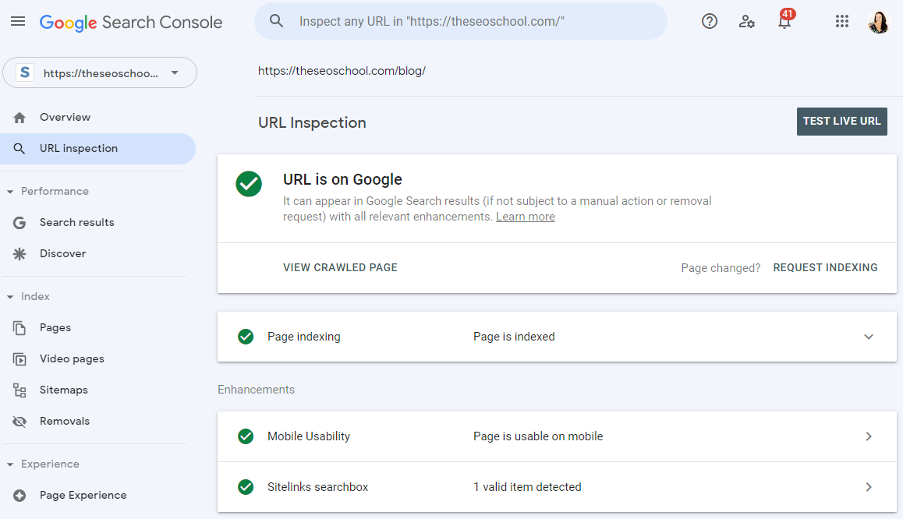
DIY SEO – Getting Your Website Indexed When You First Launch
Getting your website found on Google should be your number one priority when you launch your new website, this is true whether you just want to rank for your business name, or for keywords that are niche and highly relevant to your business.
In fact, attracting organic traffic needs to be the continuous focus of your digital marketing strategy from the launch date onwards, so let’s get started by showing you some of the most important steps on how to do it.
How To Get More Organic Search Traffic
Research reveals that organic search makes up over 54 per cent of all web traffic – and that figure is probably much higher – which means your SEO needs to be up to scratch from the start if you want to be competitive. Google is the main source of mobile and desktop searches worldwide (76% and 86% respectively), but the other search engines are important too.
Digital visibility starts from the ground up. In other words, your website has to be structured correctly with key SEO basics in place in order so that the search engines can find you. And the most important starting point of your SEO is getting your website indexed.
What Is Indexing In SEO?
Indexing is the process by which Google, Bing, Baidu and other search engines organise information they find on websites so that they can present relevant responses in their search pages to the users’ search queries.
Search engine bots or spiders browse the web continuously looking for new information. That could be a new page on an existing website, a page that’s been updated or a whole new website.
Once the search engines have found a page by ‘crawling’ the web, they then gather and process the data before adding that page to others that contain similar information. Just as a book’s index contains a snapshot of the content and where to find it, the search engines maintain a searchable index of information that has been gathered by the bots and which has been categorised in various ways.
When someone types a search query into Google, the algorithm rapidly sorts that information and dishes up results according to the keywords entered.
This article deals with what to do to get your new site indexed.
Five Ways To Get Your Site Indexed When You First Launch
1. Set Up a Google Search Console Account
This is a free tool which helps you monitor, maintain and troubleshoot your website in Google’s search results. It gives you really valuable insights into how Google sees your site and you can use this data to improve your chances of appearing in the search pages. You need to sign up and then verify your account to get the information you need about your website.
Check out our blog on Awesome Tips For Using Google Search Console for more info on the Google Search Console.
2. XML Sitemap
An XML sitemap lists all your important pages so that Google and the other search engines can understand your website structure. It tells them about the files on your website, making it easier for the spiders to find, crawl and index all the pages.
This step is an absolute must – and once you’ve created your sitemap, you need to submit it to your Google Search Console account.
Your sitemap.xml is often built into your website if you use Wix, Squarespace or Shopify, check out yourwebsite.com/sitemap.xml
If your website is built on WordPress then you would need to add a plugin such as SEOPress, RankMath or Yoast to create your sitemap.
3. Ask Google To Crawl New Pages
One of the great features of Google Search Console is to inspect any URL on your website and see if it’s in Google’s index. This enables you to ask Google to crawl new or updated pages of your website and see if there are any issues that need fixing.
Once you have verified your Google Search Console account you can inspect any URL in the box at the top of your Google Search Console account, this is visible on whichever page you are on. You can type in any page of your website and press Enter, Google will then review the URL to see if the page is already in their index.

If the page isn’t in Google’s index you can click Request Indexing and Google will crawl your website.
4. Link Pages Internally
Your website navigation is key to getting your pages indexed quickly. By connecting your internal pages with one another, you ensure they are all indexed by Google. Start by ensuring your home page is indexed and then interlink all other pages to it.
5. Update Your Content Regularly
Your content strategy for your new website should be focused on search results. Publishing relevant, useful, unique and engaging content will attract the bots’ attention and help get your site’s pages crawled on a regular basis.
Tip : Content isn’t only about what you see on a page. Other crucial SEO elements like metadata need to be addressed in your content strategy.
These five things are absolutely crucial to kickstart your opportunities for indexing when you’re building a new website. But remember, indexing isn’t static. Imagine your website is a living entity and needs constant nourishment for it to grow and thrive. Frequent updates = frequent indexing = improved search results = better business.
Some Other Things To Consider To Get Your Website Indexed
If your site isn’t getting indexed, you should investigate the following:
- Problems with your server, eg it could be under maintenance or there may be issues with the DNS delegation
- A meta robot on a particular page which is preventing it from being indexed
- Pages that have a robots.txt file which is specifically denying access to bots
- Inaccurate configuration of .htaccess files in the root folder
- Incorrect configuration of your URL parameters
- Broken links, 404 errors and other incorrect page redirects
- Whether you’ve bought a used domain that was previously de-indexed by Google. If this is the case, you should contact Google to reconsider.
A Final Word on Getting Your New Website Indexed by Google
Online visibility starts with getting your indexing right, so I always recommend that people focus closely on this crucial area right from the start. Put time and energy into creating indexing opportunities, monitoring your pages’ performance and solving issues as soon as they appear and you’ll see your efforts translate into search engine success. If you’re new to SEO my free SEO Starter Kit will help you.
And for DIY SEO success, why not have a look at my online course, The SEO School?
This hands-on, self-directed online course will take you through all the ins and outs of successful SEO and best of all, you get to implement my tried-and-tested strategies on your own website as you progress through the course. Sound good? Find out more or book your SEO course today.
FREE Community
Are you frustrated customers can’t find your website?
Join my FREE online community for SEO tips!
seo Freebies
Are you the best kept secret on the internet?
It’s time to change all that with my DIY SEO freebies!
The SEO Course
Do you have a website that’s not performing? Learn SEO and put your website to work!
Other Blog Posts...
We talk about how technology and digital communications have literally put the whole world at our fingertips, but the reality is that we still love local. And that’s why we have to love local when it comes to SEO. Why does local SEO matter? Local SEO is important because the days of relying on a Yellow Pages
AI is on everyone’s lips. All the talk is about what AI can do and what it is going to be able to do. Some people even have it taking over the whole world, sending humans into a life of servitude to machines and computer systems. Should we fear the future? If you’re a content creator, here’s some good news. This
It’s no secret that SEO requires a multi-pronged approach in order to be effective. Some elements are simple and easy to implement while others require more technical expertise, but each one plays a role in great SEO. This article covers one of the most important elements of SEO…backlinks. Backlinks are links to
Want free SEO support?
Then join my Facebook community…

If you’re looking for a supportive online group that share the same mission – to get found online – then this community is for you!
From SEO updates and tips to Ask Me Anything Fridays, this is your space to pick-my-brains.








